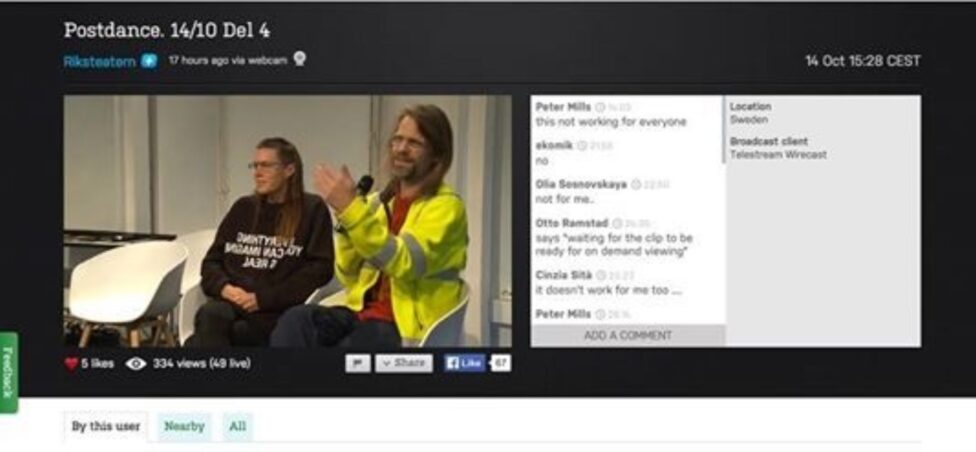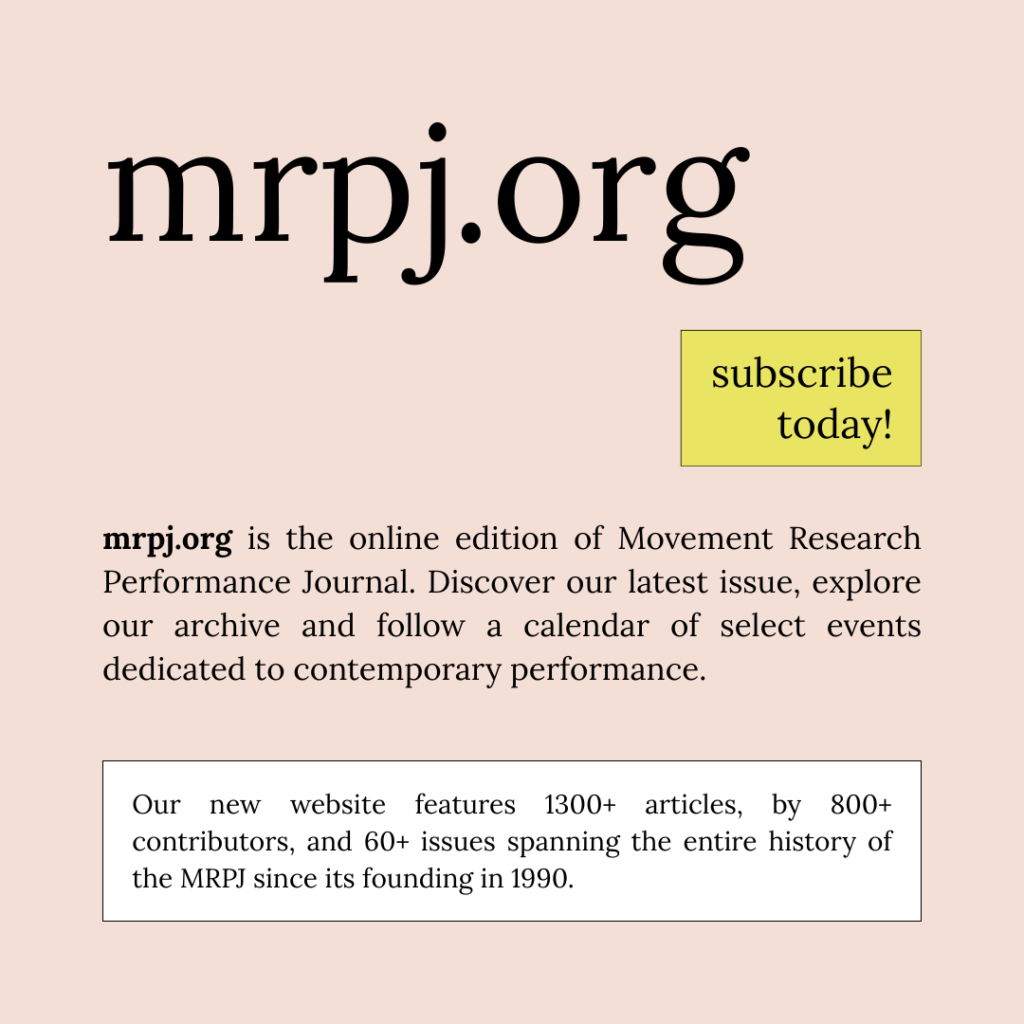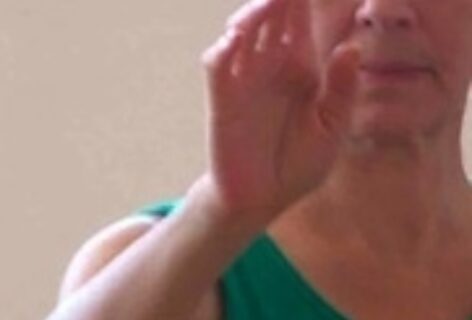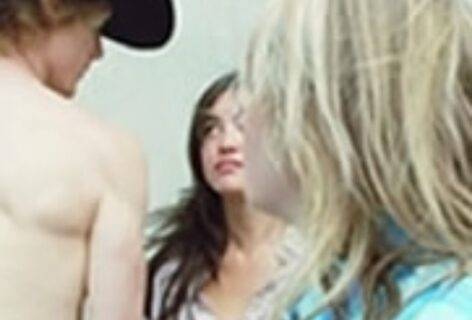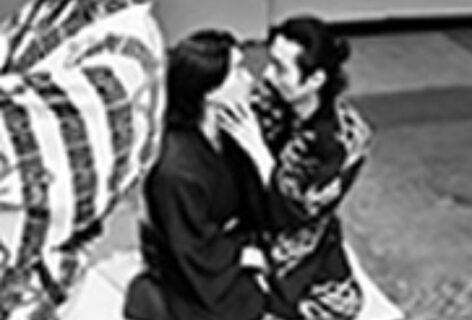October 14th, 2015
Juli Apponen: This performance that was just recently described to me because a friend of mine saw it, and it has this, they are naked in it a lot, which apparently is still is considered a thing that pushes boundaries—personally, I don’t really get it. I’ve just made a piece naked but it was because it was about a body, specifically my body, so, and it was very much anatomy, in a way, so the decision to be naked was very clear, it’s just a rational thing.
Moa Sahlin: Yeah, you will kind of miss the point if you had costume on.
Juli: Totally miss the point.
Moa: I haven’t had an opportunity to see your solo yet but I’m hoping to see it in Gothenburg.
Juli: François [Chaignaud], in the panel, was mentioning something about pushing boundaries that, it wasn’t their intention, and it wasn’t my intention either, to push any boundaries, because I was just the subject, investigating the subject: my body.
And, I don’t know, well my body specifically maybe it’s pushing some boundaries, because I did some things to it that are considered quite radical, that I had a genital reconstruction surgery which then makes my body exotic, I would say. If that’s pushing some boundaries, I don’t know, not so much from my viewpoint but I do acknowledge that it does that in society. But, anyways. They [Francois Chaignaud and Cecilia Bengolea] were doing this, they were naked and they had this anal penetration scene where she has, as my friend described it, a big strap-on dildo on and then after a while he sat on it slowly, and it went all in and then they danced, or did the choreography—I don’t know if they call it dance or choreography, for like 10 minutes. And she said it was really beautiful and intense. But I think André [Lepecki] said something interesting in relation to this which was about that boundary, that going into the body. I totally understand that idea of why is it interesting, that penetration, because we don’t often get under the skin like that. The asshole is, in a way, an opening to the inside of our body, that we—
Moa: And for some, I was thinking in the coffee queue—I’m making a jump here but will connect back to this. I was talking to this woman and she asked me, “are you a dancer/choreographer?” I’m like, Yeah. And then we had this pause and then was like, so am I now gonna ask her if she’s a dance choreographer or are we gonna talk about something else? Then I asked, What are you working with? She said, “I work as a innovation manager, and I’m working with the choreography for huge companies and organizations.” She was a bit irritated about the coffee line being a bit slow. It was because one guy was making all the so we had to talk to each other. In that sense, in those ten minutes of intense choreography or dance or whatever articulation Cecilia and Francois would like to name this intimate act that they did, I’m thinking, I mean, this woman in the coffee queue was talking about how it’s so many people who still don’t know their body. They have this body knowledge that’s—I’m a head and the legs transport me from one place to another. Then on the other hand we have all these super sensational works with the body, being in another one’s body. With all this digital stuff going in other rooms. Now it’s come to working with the penetration, or going inside. I also think of another visual artist, Ann Hamilton that’s working with a camera inside her mouth. We can see how she views the world from her mouth. What is present, what is the future? You could not, back in the day— a camera was so huge that you can’t have it in your mouth, and back in the day it was only in the sex club you could do an act of penetration but now it’s more like—
Juli: —definitely, these things have changed. Shows like CSI, where they—and other TV shows where they do abductions—I think this was a kind of big change in our popular culture imagery. We actually start to see people being cut up, even if they’re not real people, but they look really real. But I think, because it’s called POSTDANCE and so on, and then we’re trying to localize this modernism and postmodernism. But this fascination with the body and our physics, I really don’t need this kind of historical context for it because of course it’s interesting to discuss how stuff happened and what is generated and is created. But the fascination of the body and our physical things goes through as a line through history. And we also think that we are more radical now than we were before, whereas very radical things have been done with bodies for a very long time.
Moa: You were using the Urban Dictionary—what’s the quote?
Juli: The quote I found before coming here—
Juli: I googled Postdance, and ended up in the Urban Dictionary, and there was something called “Postdance Syndrome” and the quote was, that “Postdance Syndrome” is: “the feeling that you have after going to a dance with a girl, which usually makes you feel sad, and want to be more than friends.” And I think this is a fantastic sentence, because first there’s the action of going to a dance, which we interpret in different ways, maybe it’s for fun, maybe it’s for like, professionally, but it’s done out of desire for doing something with our bodies. Then it becomes an action—we did something with our bodies. But then we also relate it to another person, we were dancing with a girl. Then there was this affect—it made us sad. But then there’s also this kind of emotional hope or want or desire for it to be something else. So I’m still decoding this fantastic sentence in context of the POSTDANCE conference. And I’m just wondering if this, in a fantastically arbitrary way, is explaining a lot.
Moa: I think for me now the visible and invisible and risk and desire—there’s a lot of people working with their bodies, are involving the boundaries there. Do you set your own boundaries or do you get boundaries? So, we have to go back to the conference now, so we wrap it up and I say thank you, and we hope that we recorded what we were talking about.
Juli: We could talk more
Moa: We can talk absolutely more, maybe we continue this at 5 o’clock
*******
Moa: We did twenty minutes earlier and now we will do twenty minutes of conversation again. But now we’re in another place, right Juli? But it’s still the same day.
Juli: Quite exhaustive I would say.
Juli: Yeah, I feel like I have a fever. It’s just because I’m exhausted.
Moa: So we need something soon, like food, beer, or something, but now we are so passionate about this, so we just have to talk more.
Juli: Mm, I don’t know where we ended up—in the anus?
Moa: Yeah, we were in the anus, 10 centimeters up, and then we come out. And then we went into the mouth, so we’re really exploring the inside of the body.
Juli: I was connecting that, in a way, to Jonathan’s [Burrows] talk, because he did a very, poetic speech. He kept bringing up this cellular element of the body and how it remembers things as a threat to history.
Then the second panel was talking about this concept and ideas but then there’s the body and just the physical reaction.
Moa: And also, I think of embodying these ideas—you read about them, talk about them, but then after some time you want to embody them, you want to take them in, you want to digest them, into your own system, and see what comes out. We’re talking about boundaries but I’m thinking also about rooms. We talked about the panelist’s [Florentina Holzinger] work being maybe sexual, and then the panelist says, yeah I don’t want to talk about sex, it’s too early, it’s too intimate. I was looking at her hand a lot because she wrapped it up. She was talking about that she was kickboxing and she was talking about competition and how she’s now the top of the pyramid and then sex work came along also.
Juli: The kickboxing relates to this kind of physical activity with the body—we’re still experimenting with the body in many ways, no matter how post, or whatever, it is.
Now I’m a little confused—all these discussions about calling yourself a dancer or your work is dance or choreography, it’s rather judgmental and harsh in a way for me.
Moa: Yeah. Now I’m going to take the opportunity—because we don’t live in this city, right? We have been living in other cities, Copenhagen, Gothenburg, West Coast, up north, we’ve been living in Norway and in other places. I’ve been feeling that there’s another system with other strategies here in Stockholm. But even though some are proposing other strategies now, I feel that not so much has changed over ten years. So if it will be a post-dance then they have to really work on the strategies of making it post-dance, as I see it from my other cities, and my other communities.
I mean saying it starts with a lonely white man and ending it with a lonely white man is one thing, but doing something about it, even if someone jumps up onstage, like Malin Arnell did, and taking the opportunity, it also says something about the readiness to change. From white patriarchy to the ´other bodies´women, queer, transgender, black, yellow, red, crip, cyborgs etc.
Moa: I’ve inserted images and quotes from Malin Arnell’s Facebook page that show her intervention into Marten Spanberg’s “wrap-up” lecture from Day One of the conference. Arnell entered and sat next to him while he criticized the fact that he, a middle-aged white man, was yet again on stage in a position of authority.
16.30-17.00 WRAP UP, day one: Mårten Spångberg speaks:
“The second little weird thing is that we started with a middle-aged white man (who was alone on stage) and we end with one… so what kind of authority does a dud like me have to wrap something what so ever… we can also think that people like me have been wrapping up for the last several centuries, millennia in order to… (Malin enters) and now of course I shot my self in the foot because I now have to share the microphone, which of course I did not mean… this proposal should just be a rhetoric ones. and you should say he is a really good guy, he knows what he is talking about and his political position is awesome…”
Nothing change with (good) political positions only with actions. Here I say: A position comes with responsibility, it’s time do act differently, make other choices. It’s time to share with many and to listen. —Arnell
Juli: This was in the context of talking about institutional critique.
Moa: And also the notion of beauty—you wrote something here on the paper.
Juli: It just happened that I never spent a lot of time here in Stockholm and I really don’t know the context here, so I’m coming here as an outsider, plus I feel quite outsider everywhere because I’ve been moving around so much.
Moa: You’re the nomadic dance artist.
Juli: Right now I am. So I just pop up in places and see them for awhile and then I go.
Moa: But you said something about beauty during the lunch, that you never seen so many beautiful people in one place before.
Juli: Yeah, it was like, people are so freaking good-looking here. It kind of becomes uncomfortable. It’s also like with spaces that are predominantly white, they are also uncomfortable, because there are people missing.
Moa: This also came up—being comfortable in the white room. Someone really tried to talk about racism but there was not really room for that. This is a problem for me. I mean, it’s such a huge conversation going on—I mean we just had Angela Davis in Stockholm, and that’s not even mentioned here, I mean, come on. Don’t you think? I mean there are people with black skin here, but it’s really like, out of 160 people, there are maybe ten black audience members, tops.
Juli: It is mainly white spaces and able bodies that not only are able but super able. And good-looking. But beauty was mentioned also in the panel discussion—“Nobody talks about beauty anymore.”
Moa: They were trying to have a conversation about the durational and Cecilia [Bengolea] said, like, “No, I’m lazy. I don’t want to explain this, I can send you some YouTube clips.” And then Lepecki was referring to this other conference where he worked and there was this also this durational pause, like a kunst pause. And he’s like, “yeah, durational can also be beautiful.” And there were a lot of visual artists or curators, “Ooh, he’s introducing beauty again” as if it was being bad.
Juli: I felt there was some kind of consensus that we’re in some kind of post-beauty era, which is strange for me because you can’t deny aesthetics, even if you tried. You just create different aesthetics. For me, beauty—I use it, consciously, because it’s a powerful thing.
Moa: It’s a powerful word. I like that the notion of beauty has changed, from being a norm of The Golden Cut [The Golden Ratio]—the mathematical version of beauty—to something where you say, I’m beautiful and I say I’m beautiful. With our spirals and identity marks and what life has done to us. It’s another “beauty” than the one we used to talk about. I like that we are redefining it. What maybe was referred to as ugly now has new places, new bodies, new words—we can reclaim the word beauty.
Juli: But there’s also something, I think there’s something liberating in The Golden Cut, about aesthetics—aesthetics are basically not taste. The Golden Cut is based in nature and I don’t always like taste because it sometimes creates these post-modern, meta-performances that are very self-referential. It’s not accessible for many people. So beauty and aesthetics represent something else for me than the white ideal that you brought up.
Moa: You said something about crafts, I thought that was interesting, it was something with a dancer in the Cullberg Ballet. She came here from the states and she’s asks, “I have a two-year contract, and it feels like I am taking care of my craftsmanship as a dancer.” It felt like, for the first time, as a dancer, she had the platform to talk from.
Juli: I thought that was interesting when Florentina Holzinger brought up the fact of performance artists working as sex workers to make an income, which in this context came from out of the blue.
Moa: Nah I listed to it with other information. When I was in my twenties in 1994, here in Stockholm, sex work was talked about. Yeah, are you open to be an escort girl, how do you look upon that? It was maybe three years ago that former prima ballerina Anastasia Volochkova, Bolshoi Ballet said that she had been told to work as an escort girl after the performances. It’s always been around since 18th century. Ballet was good and then all of a sudden no one came. They thought, this is not in fashion, and the ballet companies were desperate because they built all these huge opera houses, so then they started to take patrons to the bar after the show and offer ballerinas from which to pick and choose. So this is the history of dance. I thought it was gone.
Juli: I know sex workers but they also do porn and performance art related work, so it can be considered to be little bit in the same field. It’s not about financing a dance piece with sex work, it´s maybe more a part of their experimentation with their bodies. Bringing up sex work in a Scandinavian middle class dance context is maybe not the hottest topic right now. You´ll probably get more from the social welfare in Sweden than you’ll make on sex work.
The question of sex work was quite oddly posed and nobody really had an answer because there was no one who actually wanted to speak up. But it felt like an awkward silence, which was kind of nice for the dynamics, I thought. It’s nice when people don’t really know what to say.
Moa: But I also think, because she [Cecilia Bengolea] brought it up, that maybe she knows people here that need to speak about it, that are right now sitting in another part of this building in the corner recording that conversation. Wouldn’t that have been nice.
Juli: Well this is maybe not so much about the post-dance.
Moa: What’s the next boundary? What do you need/want/desire/ask for/claim? That’s a huge question, sorry.
Juli: What do I desire? One part of me is very practical. The discussion is never ending about how do we manage to make work, and what’s the economy. That becomes a practical question if you want to do something in a space, you need a space. And you have to survive also. There’s this aspect of getting the opportunity to do something at all. And then go through a process and get the experience of that and then develop something further. I don’t know anything before I have worked on it.
Moa: How much time do you need to do your work in a day? Or do you need a weekend? The panel with artists who have institutional support were talking about having six to eight weeks of creative process to develop a premiere and that it’s so hard. And I was like, wow, that’s really great, the institutions get six-eight weeks? And you have a house, you don’t ask your friends’ friends to videotape. It’s a luxury to have six to eight weeks right?
Juli: Four weeks is what I’ve discovered to be a good amount of time.
Moa: The institutions see the freedom of having this kind of security—this was what Jens Östberg was talking about. Then after sometime they were also saying that the security is a boundary. You don’t have any risk, you don’t have an element of freedom, because also as an independent artist, with some money, and some platforms, and some invitations, I can also say, “no, actually I need one more residency to make this process into something I would like to share with an audience.” I have that flexibility. At the moment, I’ve been invited to an institution, the City Theater in Gothemberg. And for me it’s like I’m gonna make one minute and twenty seconds of choreography. So it’s just a fun little gig but the impact of me being connected to that institution is huge. My friends that are not in the art business are like, “Woah you’re really making something!”
For me it’s really like, institutions work, it’s great! It adds that little cherry on my ice cream that makes it super attractive all of a sudden. So we need more cherries on our sundaes.
Juli: I can’t really talk about utopia without mentioning the practical difficulties—getting some funds—everything: space, money, and continuation of the work.
Moa: But doesn’t it make the art better, you think? The constant struggle? I’m kidding.
Juli: I like the theater space or the black box—I like the concentration of it because people sit down and there’s already a respect for the thing because they’ve already come there, physically. So if I want to work in that kind of space the practical requires that I get the money, the space, all of that, and then finally I can finally work on my desires and utopias—which are what?
Moa: But isn’t it also I was thinking about the horizon of artistic practice—when I get this money and this room then you see the opportunity to make art—you create this horizon so you can make it happen. Isn’t that utopian practice, maybe? Because there are also people who have nothing that make great art.
We are now in this community of 160 dancers in Stockholm but we also have other communities that connect to this, so what’s the conversation? What’s the food for thought that you take from this? This particular, this boundary-thingy, this conference, this POSTDANCE?
Juli: Well, now trying to map all the things that have been talked about—there’s a history of our form and everything it has gone through and where we are in this strange post-situation where some people are for the craft of dance and some people are not, some call others dancers, some people call themselves dancers. I’ve seen so many different things work, that I start to believe I don’t really have a specific taste anymore. I believe that almost everything can be made to work, but I believe in composing and articulating things, because that’s, in my opinion, what we do.
Moa: Yeah, because it’s also about how to actually practice to articulate. Like, now we have accepted the invitation from Will Rawls to refer to what was talked about in POSTDANCE, so we have this conversation. If I did not have this conversation, knowing that Will would listen to it and transcribe it—I would talk about it a little bit and write a little bit about it but probably forget it quite quickly, which now, I’m more aware of you, and what you’re working on, and I’m taking this postdance syndrome as a funny game to play with. And hopefully I re-articulated myself by just acknowledging, and speaking, using my voice and speaking up, in a way.
Juli: Which is terrifying. Because I feel completely inadequate and never articulated well enough.
Moa: But we are pre-product. How can you be articulated enough when you don’t practice?
Juli: That’s what I mean. If I’m not doing work, if I’m not doing any processed material of some kind then I’m not having any impact in anything. I’m just quiet. This things of risk and failure came up.
Because failure, Mårten Spångberg brought it up again that failure becomes its own thing that feeds itself and its actually not so useful. I believe more strongly in risk than in failure. I’m doing this discussion with you that I agreed to yesterday, and this is also taking a risk, because I am obsessed about articulating things properly. I was quiet for many many years just because I wanted to think about things before I said them. But I do speak up more nowadays because that is the only way to make material or make something.
Moa: I remember you as a quiet one, sitting and thinking, but it felt like—I think it’s the dance teacher in me—was like this person is going to say something super intelligent five or ten years from now. But they are still grinding the coffee beans, but soon the hot coffee is going to be out. And I’m so happy that you said yes, it was really like a chance procedure. Now you’re here and you’ve been articulating your thoughts and will continue.
Juli: And hopefully, said something that is worth something in the stream of information that we stream out in the world.
Juli Apponen is a performer, choreographer/director originally from Finland currently based around Scandinavia and works, produces and performs in several international collaborations in an extended field of movement, choreography, vocal and visual performances.
Moa Matilda Sahlin was born in Gävle, Sweden 1974. Currently working as a choreographer, dancer,dance pedagouge and is one of three, creative Directors for Dansbyrån,which is a platform for artistic development in Gothenburg, Sweden. She received a MA in choreography 2005 at LABAN, London, UK. A BA in dance pedagogy 1998 at the Uni. of Dance Stockholm, Sweden. Her work as a pedagogue, dancer and choreographer focus on feministic contemporary dance art. Invited to the field of academics and activist community work and postmodern ideas. She has gotten accepted to; The Swedish Arts Grants Committees working grant, Gothenburg project funds, VGR project fund, Swedish Arts Councils project fund and Carina Ari grant for her work with choreographies and dance art projects. Sahlin is curious at, and experienced in inviting fellow choreographers, thinkers, movers and shakers in an international and local context. For more information and details on her work go to www.moakompani.se and www.dansbyran.se

